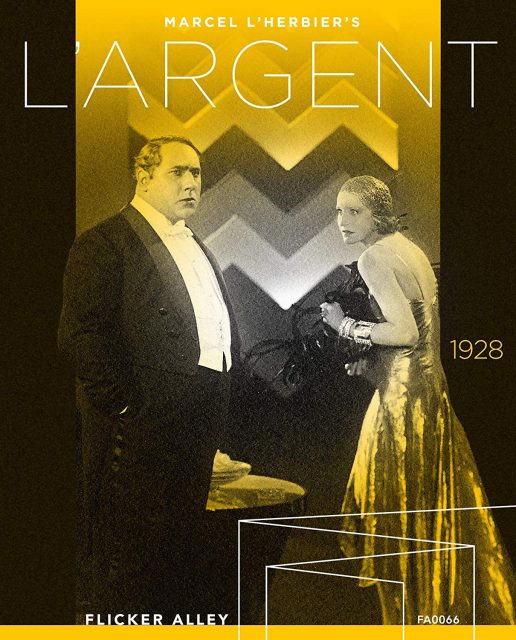Home Video Hovel: L’Argent, by David Bax

Sound was introduced into cinema in a mainstream, commercial way in 1927 and it’s always felt a little ironic and a little tragic that so many of the greatest silent films were made just as the silent format was being replaced, from 1927’s Sunrise and Metropolis to 1928’s The Man Who Laughs and The Passion of Joan of Arc, the latter a credible contender for the title of best film ever made. Marcel L’Herbier’s 1928 L’Argent is not quite in this category but it is representative of the spirit of ingenuity and daring that made these films possible. L’Herbier and cinematographer Jules Kruger’s camera goes from stalking, circling handheld shots to towering bird’s eye view looks at a busy stock exchange floor, which L’Herbier juxtaposes with an airplane taking to the sky, one of the film’s many invigorating examples of parallel editing.
Flicker Alley’s newly restored Blu-ray release runs two and a half hours, significantly shorter than the reported 200 minute length of L’Herbier’s original cut. Still, it’s a lot of movie and a whole lot of plot, much of it impenetrable to those without a mind for lucre. The gist, however, is that a banker named Nicolas Saccard (Pierre Alcover), in a publicity stunt, finances a record-breaking attempt by a famous pilot (Henry Victor). Then, he uses unfounded rumors of the pilot’s death to manipulate the stock market, all while trying to seduce the pilot’s wife (Marie Glory). Meanwhile, a rival banker (Alfred Abel) and a sinister Baroness (Brigitte Helm from Metropolis) conspire to ruin Saccard.
Other twists and turns abound but L’Argent, which means “money,” finds its power not in story details but in an illustration of how the wealthy serve no principle but wealth and how everything and everyone else is just numbers on the ticker. This point of view is as relevant today as it has always been but it feels especially so when Saccard actually uses the term “fake news.”
L’Argent‘s other themes are mostly hoary ones about things like love and affection and the supposed inability of money to purchase them. It’s largely familiar stuff but when it’s told with such boldness and beauty, who cares?
L’Argent was restored by Lobster Films, the French CNC, SACEM and the director’s own daughter from the B and C negative. Many of the intertitles were reconstructed. Some reconstruction and preservation of the film were done in the 1970s and 1990s so it’s hard to say who should get the most credit but the upshot is that the film looks terrific. And the new score by Olivier Massot, performed by the National Orchestra of Lyon and conducted by Timothy Brock, is lovely.
Flicker Alley’s disc includes at least one absolutely crucial special feature. It’s a making-of documentary filmed while L’Herbier was making L’Argent. There’s even a featurette on the restoration of the documentary. Also included is a short film by L’Herbier, an essay by Mireille Beaulieu and a bevy of images of L’Herbier and the making and marketing of L’Argent.





























I watched The Man Who Laughs a few weeks ago, and it doesn’t seem to belong at the same level as those other films you listed.
I think part of the reason a lot of great silent films were released about that time was because people were getting good at the form. I’m not the first to note that once sound arrived they had to rethink how they filmed and they didn’t get it right instantly. Going back to The Man Who Laughs, there is actually some sound in it, and they nearly made it a talkie, but Veidt’s prosthetics meant he couldn’t speak. The sounds included tend to consist of a lot of muttering by crowds and seem to be included simply because they could be.
I’m sorry to hear you don’t like The Man Who Laughs as much as I do. I think it’s really special.
– David